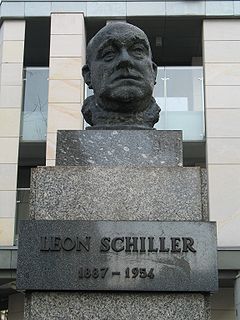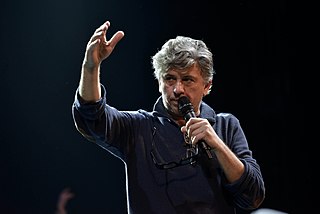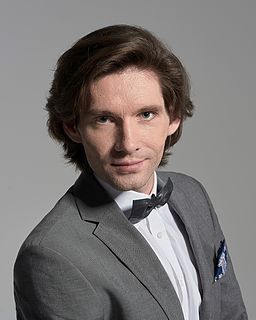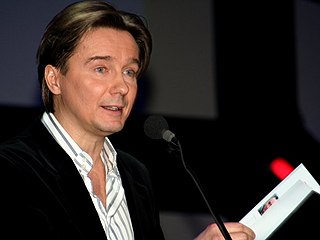This section may have been copied and pasted from http://teatrwielki.pl/en/people/tomasz-wygoda// ( DupDet · CopyVios ), possibly in violation of Wikipedia's copyright policy .(December 2017) |
Tomasz Wygoda is a Polish dancer, actor, choreographer, and educator.

Choreography is the art or practice of designing sequences of movements of physical bodies in which motion, form, or both are specified. Choreography may also refer to the design itself. A choreographer is one who creates choreographies by practicing the art of choreography, a process known as choreographing. Choreography is used in a variety of fields, including musical theater, cheerleading, cinematography, gymnastics, fashion shows, ice skating, marching band, show choir, theatre, synchronized swimming, cardistry, video game production and animated art. In the performing arts, choreography applies to human movement and form. In dance, choreography is also known as dance choreography or dance composition.
He graduated in history from the Pedagogy College in Kielce. In 1997–2003 he was a dancer with the Silesian Dance Theatre in Bytom, appearing in productions by Jacek Łumiński, Konrad Drzewiecki, Henrietta Horn, and Paul Clayden. He was also a guest dancer with Jonathan Hollander’s Battery Dance Company, NY, and was awarded a DanceWeb scholarship in Vienna. [1] He has performed in the USA, UK, Germany, France, Canada, and Italy.

Kielce is a city in south central Poland with 196,335 inhabitants. It has been the capital city of the Świętokrzyskie Voivodeship since 1999, and was previously the capital of the predecessor Kielce Voivodeship. The city is located in the middle of the Świętokrzyskie Mountains, on the banks of the Silnica River, in northern part of the historical Polish province of Lesser Poland.

Bytom is a city in Silesia in southern Poland, near Katowice. It lies in the central-western district of the Upper Silesian Metropolitan Union – a metropolis with a population of 2 million. Bytom is located in the Silesian Highlands, on the Bytomka river.

Vienna is the federal capital and largest city of Austria, and one of the nine states of Austria. Vienna is Austria's primate city, with a population of about 1.9 million, and its cultural, economic, and political centre. It is the 7th-largest city by population within city limits in the European Union. Until the beginning of the 20th century, it was the largest German-speaking city in the world, and before the splitting of the Austro-Hungarian Empire in World War I, the city had 2 million inhabitants. Today, it has the second largest number of German speakers after Berlin. Vienna is host to many major international organizations, including the United Nations and OPEC. The city is located in the eastern part of Austria and is close to the borders of the Czech Republic, Slovakia, and Hungary. These regions work together in a European Centrope border region. Along with nearby Bratislava, Vienna forms a metropolitan region with 3 million inhabitants. In 2001, the city centre was designated a UNESCO World Heritage Site. In July 2017 it was moved to the list of World Heritage in Danger.
As a member of W&M Physical Theatre he developed Made in Polska – museum of imagination (Calgary), while with Warsaw’s Breton Caffe Theatre he devised Slam out, Dancing Sarah Kane, and The Rite of Dreams, a solo inspired by Nijinsky’s diaries. He collaborates with the Stary Theatre in Kraków, performing in productions by Krystian Lupa (Zaratustra, Factory 2), Paweł Mickiewicz (Niewina), and Michał Zadara (Fedra). He also plays in Krzysztof Warlikowski’s Oczyszczeni (Współczesny Theatre in Wrocław, Polski Theatre in Poznań, TR Warszawa), Agnieszka Olsten’s Lincz and Samsara Disco (Polski Theatre in Wrocław), and Krzysztof Garbaczewski’s Kamienne niebo zamiast gwiazd (Nowy Theatre in Warsaw). [2]
Tomasz Wygoda devised choreographies for Medeamaterial, The Fall of the House of Ushers (directed by B. Wysocka, Teatr Wielki – Polish National Opera), Orestea (directed by M. Zadara, Teatr Wielki – Polish National Opera), La libertà chiama la libertà (directed by Zadara/Knapik, Wrocław Opera), Jakob Lenz and Halka (directed by N. Korczakowska, Teatr Wielki – Polish National Opera), The Ring of the Nibelung (Gergiev/Tsypi/Zeldin, Mariinsky Theatre). He also created choreographies for productions by Mikołaj Grabowski and Jan Peszek, Monika Pęcikiewicz, Wiktor Rubin, and Maja Kleczewska. He collaborated with Mariusz Treliński on La Bohème (Washington National Opera), Boris Godunov (Vilnius, Warsaw), King Roger, Aleko, and Iolanta (Mariinsky Theatre), Orfeo and Euridice (Bratislava Opera, Teatr Wielki – Polish National Opera), La Traviata, Turandot (Teatr Wielki – Polish National Opera) and Manon Lescaut (Teatr Wielki – Polish National Opera, La Monnaie), The Flying Dutchman (Teatr Wielki – Polish National Opera), and Iolanta and The Blebeard’s Castle (Teatr Wielki – Polish National Opera, Metropolitan Opera), Salome (Prague, Warsaw), and Tristan und Isolde (Mettropolitan Opera, Festpielhaus Baden-Baden, Teatr Wielki - Polish National Opera). In March 2015 he premiered his piece Melancholia/Violetta Villas (Melancholy/Violetta Villas), a coproduction of the Capitol Theatre, Warsaw and Nowy Theatre, Łódź. [3]

The Metropolitan Opera is an opera company based in New York City, resident at the Metropolitan Opera House at the Lincoln Center for the Performing Arts. The company is operated by the non-profit Metropolitan Opera Association, with Peter Gelb as general manager. As of 2018, the company's current music director is Yannick Nézet-Séguin.












